
Good habits are the key to the success of any Boss Babe. However, forming good habits and most importantly sticking to them can be a challenge. I wanted to write this post to give you all the inside and out of how to create new habits that will transform your life and continue bringing you success.
I have been on this habit-making journey for a long time. And it is a journey, with ups and downs. Some habits are easier to maintain, and some are difficult. Some stick and some don’t. The biggest change for me on this journey came when I listened to the audiobook – Atomic Habits by James Clear. It basically covered all the ins and outs of building habits with practical tools and tips to help you out. I loved it and it made me seriously step up my game and make lots of positive changes in my life.
I wanted to share this with you too. Because as small as these small changes and small decisions seem at the time, the sheer accumulation of those small habits can change the course of your life. This is an atomic habits summary only, talking about the most important take-home messages so that you can start implementing them into your life right now. But I still encourage you to pick up the book/audiobook because a summary cannot do it all the justice.
Disclaimer: This site contains affiliate links to products. We may receive a commission for purchases made through these links. Visit my disclaimer page for more information.
What is the definition of a habit?
In simple terms a habit is:
“A habit is a behaviour that has been repeated so many times that it becomes automatic”
HOW TO CREATE GOOD HABITS THAT TRANSFORM YOUR LIFE
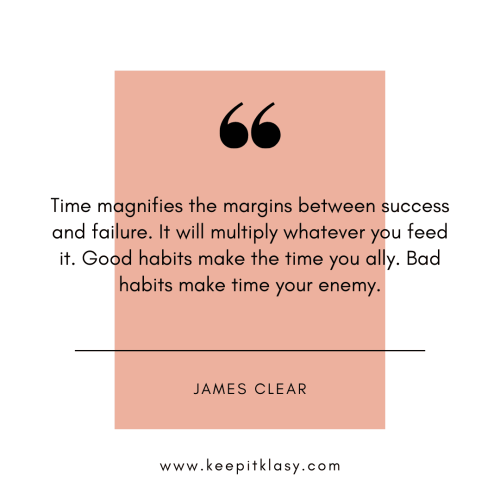
#1 The reason small changes work
The problem with forming habits is that often, it takes a very long time to see results. This is fundamentally what makes it difficult to stick to new habits. We live in a culture where we do often focus on instant gratification but in reality, very few things in life bring results overnight. In many cases, the results accumulate over a long time. The results you may see in another person’s life, are most likely only the tip of the iceberg. You do not see all the work that went on underneath.
However small habits accumulate over time IF you stay CONSISTENT.
An eye-opening lesson in atomic habits that made me appreciate the importance of these small changes and their compounding effect over time was the 1 % rule.
1% rule
If you improve in something 1% every day for a year, you will get 37 x better at it in that 1-year time frame. This is so true, and it makes those small changes worth doing.
However, this goes both ways. If you stick to bad habits, you could end up 37 x worse off. Because habits take a long time, it is easy for bad habits to slip in and throw you off your game. So, stay aware.
#2 Focus on systems rather than goals
This is key because there is so much hype currently about building goals. The problem with this is that
Goals: are all about the result and what it is that you want to achieve.
Instead of focusing on what you want to achieve try to focus your attention on what you can do to lead to those results. Focusing solely on a goal can halter your progress because in reality winners and losers all have the same goal. What will make the difference between a loser and a winner, is that the winner took the appropriate action to make that goal happen.
In addition, if your mind is goal-focused you will never be satisfied with the achievement. Once you reach one milestone you will seek to achieve the next one. Or on the other end of that, once you do reach the goal, you’ll stop putting in the work. Focusing on progress rather than goals and milestones will ensure habits become a long-term thing.
This is not to say goals are bad. Goals are an important part of the process, but you have to take the next action step to make them a reality.
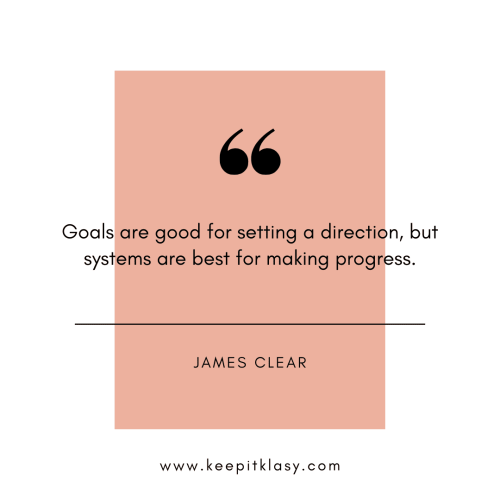
#3 Know that results are exponential, not linear
When you start a new habit, the result will rarely be linear. It will take time to see and results or progress. The hardest part is sticking with the new habit in those initial stages. However, there will be this threshold point and once you get past this point, the results you see will grow exponentially. It is worth it, just don’t give up in the beginning when the results are not obvious.
#4 Change your identity to change your habits
The way you see yourself, your core, values, and belief truly have a way of determining your habits. Both the good and the bad ones. Therefore, the most effective way to change your habits is to change your identity.
Typically, there are three levels of change
LEVEL 1: Outcome change: which is driven by results and achievement. It is a very surface-level type of change.
LEVEL 2: Process change: This focuses on this idea of changing systems and what you do, rather than what you want to achieve.
LEVEL 3: Identity change: this is the deepest layer of change which includes your belief, core values, and biases. In other words, it is all about what you believe and who you wish to become.
Level three is the change you want to focus on to make habits that stick for the long haul. Often simply changing the word you use when describing yourself or your habits can be enough to start making that shift.
Here are examples to explain this a little bit better.
LEVEL 1 CHANGE: You would say I want to be healthy, so I won’t have that cookie < GOAL ORIENTATED
LEVEL 3 CHANGE: You would say I am healthy therefore I do not feel the need to have the cookie. < IDENTITY ORIENTATED.
To change identity, you need to follow a two-step process
- Decide what type of person you want to be
- Prove it to yourself with small wins

#5 The 4-step process to building better habits
Habits are amazing because they help to solve a recurring problem and help to make the change and result everlasting. There are 4 steps that you should utilise when building habits that will ensure that you will stick to those habits long term.
- Make the cue obvious: for example, set your workout clothes in plain view so you can easily reach for them.
- Make the craving attractive: invest in new, comfortable, and colourful workout gear that makes you feel confident and motivated.
- Make the response easy: make exercise the first thing you do in the morning or when you get back home from work before you have any chance to make excuse or get distracted by other tasks.
- Make the reward satisfying: other than having endorphins flowing through, you could reward yourself with a nice bubble bath or an episode of your favourite show. Only do the exercise that you enjoy.
#6 Get rid of bad habits
To make good new habits that bring you the desired results you also have to get rid of the bad habits that will halt your progress. As already mentioned, habits are automatic so you might not realise you are in a bad habit loop. To change bad habits your need to be aware of the behaviours that lead to the bad habits. You could start by pointing out bad behaviours. This way you will start to build awareness and it’ll be easier to make the step to change them.
For example, if you want to eat healthily, write down everything you eat in a day. Review this and decide if it is healthy or if there is something that needs changing.
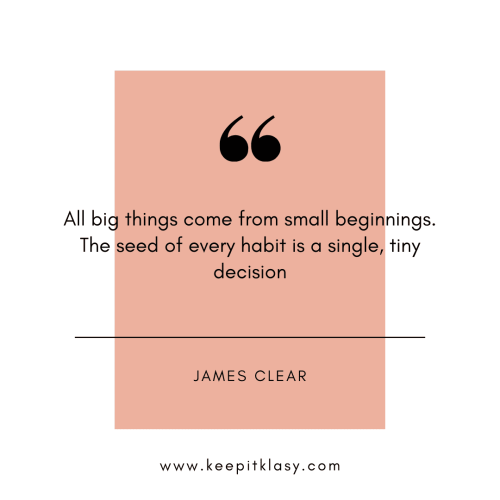
#7 Set a specific time and location for your habit
Decide on the time and location for your specific habit. An example: I will work out at 7 pm in my living room. To make this even more efficient you can utilise Habit stacking.
Habit stacking
To make introducing new habits more manageable try to link the new habit to an old habit. For example, you could decide that after your evening shower you will read for 20 mins in my bedroom.
#8 Pick the right environment for your new habit
Our environment shapes our habits, even when we are not consciously aware of it. The world around us does influence our behaviours.
It is much easier to create new habits when you are in a new environment because you will not be reminded of your old, bad, habits. If this is possible, try changing your routine so that this new habit can be performed in a new environment. Every habit has a cue. When you are in this new environment make the cue for the new habit obvious so there is nothing standing in the way of you doing this new habit.
#9 Improve self-control
If there is something that could interfere with the new habit get rid of it, make it invisible so you are not even a little bit tempted by it.
You are essentially getting rid of the cues for your bad habits.
#10 Make the new habit irresistible
Make the habit attractive to you. Make the habit itself the reward. What truly gives us the motivation to do something, is the anticipation of the reward. Much more than the reward itself anyway. It is the anticipation that releases dopamine (reward hormone).
You could pair the habit with something you enjoy doing. For example, I love working out while watching Netflix or listening to my favourite podcast. This is called temptation bundling.
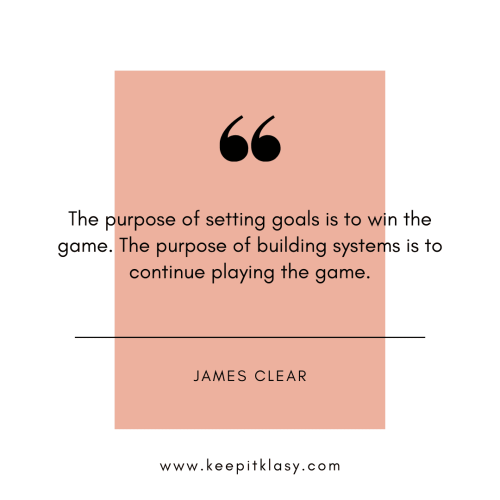
#11 Be aware of how the people around you shape your habits
Everybody wants to fit in and be a part of a group or community. Utilise this when making habits. You will naturally adapt to the habit of the people you surround yourself with. Therefore, surround yourself with the people who are already doing the habit or who consider their habit to be a natural part of their lives. As an example, if you want to start exercising, spend time with people who exercise regularly. You will feel a sense of fitting it with the rest of the people and therefore, you’ll be more likely to maintain the habit.
#12 Make bad habits unattractive
Consciously highlight all the negative things about the bad habit. Write them down if it helps. Bad habits seem more unattractive when you will associate them with bad feelings and negative emotions. You’ll want to avoid those feeling and therefore the habit.
#13 Walk slowly but never go backward
In the begging, a new habit takes a lot of time, but it will get easier. You just have to be consistent for the long haul. You’ll realise one day that the habit became automatic, and it forms part of your routine without you even thinking about it. Just stick with it.
#14 Fight through the resistance
The more resistance there is towards the new habit the less likely you will want to do it. Therefore, ease this resistance by making this habit as easy as possible. For example, only have healthy food in the house, buy fun workout gear to exercise, or cute stationery to be productive.
#15 Beat procrastination
Procrastination is a killer of progress. It touches upon the point above, as we usually procrastinate to avoid the negative feelings associate with the task.
Break the habit up into small chunks so that each chunk takes less than 2 minutes to do. Any habit can be shortened into 2-minute versions. Set yourself the challenge of reading only one page of a book before you go to sleep at night, rather than 20 from the get-go. You can build it up over time. The difference between a good day and a bad day is these small 2-minute choices that you make, these choices stack up throughout the day and can lead to very different outcomes.
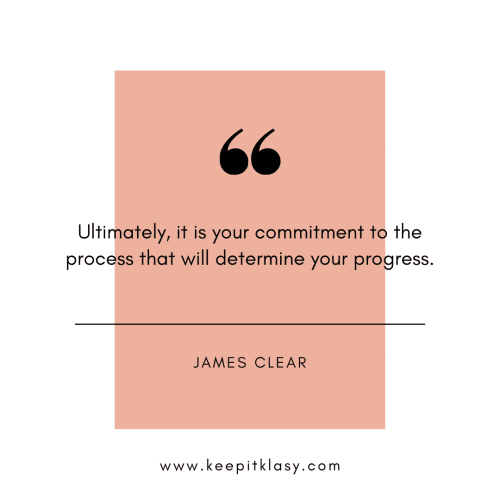
#16 Make bad habits difficult
The more difficult bad habits are for you to perform the less likely you will do them. To stop eating sweets, avoid having sweets in the house. The effort it would take to get ready and go to the shop to buy something, could be enough of a barrier to making it not worth it. Get busy with something else and the cue will soon pass.
#17 Make the new behaviour satisfying
If it is satisfying you will be more likely to do it again and continue to do it repeatedly. Your brain has evolved to prioritise immediate reward over delayed reward. For habits to stick you need to feel good immediately, even if it is in a small way. For example, start a workout with your favourite exercise or listen to favourite audiobook while exercising.
#18 Measure your progress
One of the best feelings is making progress. If the result cannot be seen physically, you could use a habit tracker to keep the score of your progress Seeing those ticks on a page will be the evidence you need to appreciate the progress you’ve made. You made a promise to yourself that you will make a positive change and guess what – you went and did it! That deserves recognition.
Try to keep the streak alive on your habit tracker and never miss twice. Missing twice is a beginning of a bad habit. Missing one is not bad it is an accident.
#19 Avoid accountability partner
That’s right! Avoid, avoid, avoid. This might be contrary to what you have thought. We are usually told that it is good when someone can keep us accountable. Well, the reason it does not necessarily work is that building habits are difficult, and we do not like to disappoint people. If there is someone who keeps you accountable, when you do fail or miss a day you will feel bad and possibly a bit ashamed. This can have the reverse effect and actually make you give up on the habit altogether because of the pressure. No one wants to feel bad.
Habit building should be an all-in-all positive experience.
#20 Chose habit that matter to you as a person
Choose the habits that best suit you and your personality. You’re much more likely to stick with something if you care about it. Certain habits will be easier for some people than others. Starting your habit journey with those will help you get into the swing of habit building.
To choose the best habits to build ask yourself the following questions
- What feels like fun to me but like work to others?
- What makes me lose track of time?
- Where do I get greater returns than the average person?
- What comes naturally to me?

#21 Keep yourself motivated with the goldilocks’ rule
Goldilocks’ rule states that people experience the most motivation when working on tasks that are close to the edge of their current abilities. When you work on something that is close to your current abilities it will be easier and therefore, you’ll experience less resistance towards the task.
To keep up the motivation you should constantly push your skills and improve performance.
#22 Continue reflecting
You will change, your identity will change, your life will change. Some habits might stop serving you at some point in your life. Make the effort to reflect and continually adapt your habits to the current version of you.
The benefit of habits is that we can do things without thinking. The downside is that we stop paying attention to the little errors we make. To avoid this error accumulation, take a moment and ask yourself:
- What went well this year?
- What didn’t go so well this year?
- What did I learn?
6 months later do an integrity report and ask 3 questions to check if your old habits are still serving you:
- What are the core values that drive my life and work?
- How am I living and working with integrity right now?
- How can I set a higher standard in the future?
On a final note.
Those are the top 22 Lessons from Atomic Habits- by James Clear… I still recommend reading the book because the examples and tips that James Clear gives are much more detailed and insightful. However, I wanted to cover the top tactics so that you can start introducing them into your life right now.
To be a successful Girl Boss, the habits you build will break or make your success. Your good habits will get you closer to your dream, but your bad habits will hold you back. Try applying some of these tips and you will be way ahead of the game…
Leave a comment and let me know how you get on with these
Have you read the book? What are your thoughts?
Natasza
xxx


